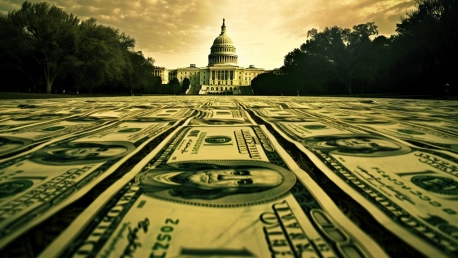The U.S. national debt has soared to staggering heights, crossing over $34.52 trillion. It’s a figure that alarms economists and policymakers alike, increasing by about $8.36 billion daily. In the face of this towering debt pile, President Biden’s administration proposes tightening the fiscal reins by heightening taxes for both individuals and corporations. However, the effectiveness of this strategy in bringing down the national debt remains a question mark. Can a policy inclined towards tax hikes without parallel spending cuts be the remedy to America’s financial woes, or is it just a veneer over a much deeper fiscal challenge?
Economic Impact of Proposed Tax Increases
Recent analysis from the Penn Wharton Budget Model offers some sobering insight into the Biden administration’s proposed tax hikes. The study, labeled as “Bundle 1,” projects revenue generation of $3.7 trillion over a decade from these increases. Yet, it accentuates a crucial point: the effect on the economy would be negligible. The predictions suggest that even with this added revenue, the trajectory of the debt-to-GDP ratio would be nearly unchanged, continuing on an unsustainable path. This marginal impact on the financial health of the nation demands a reassessment of the administration’s current fiscal strategy.The findings imply that although tax hikes could fill government coffers, they might equally stunt economic dynamism. Higher tax rates typically discourage investment, savings, and entrepreneurial risks—all vital for economic growth. The model infers that the potential economic downside negates the minor relief in debt levels that the increased taxes would bring about. This predicament puts policymakers in a bind: how to raise necessary funds without dampening the economic spirit?
Fiscal Strategy and Sustainability
Facing a national debt surpassing $34.52 trillion, the U.S. grapples with a fiscal challenge that intensifies with an average daily increase of $8.36 billion. This situation raises significant concerns among economists and policymakers. To address the soaring debt, President Biden’s administration has put forth a proposal centered on increasing tax rates for both individuals and corporations. This approach aims to generate more revenue for the government, potentially easing the burden of the debt. However, there is debate over the effectiveness of this strategy in the absence of corresponding reductions in government spending. Critics argue that without cutting expenditures, tax hikes alone may not sufficiently tackle the core issue of the burgeoning debt. The dilemma poses the question of whether raising taxes is a viable solution to the financial challenges the U.S. faces or merely a superficial fix that fails to address the fundamental fiscal problems at hand.









